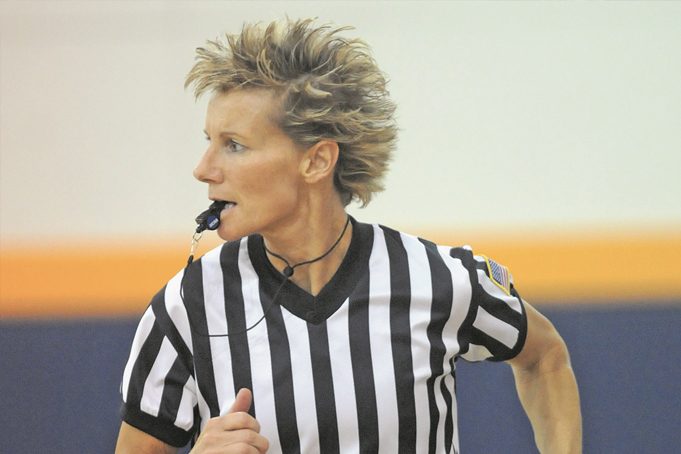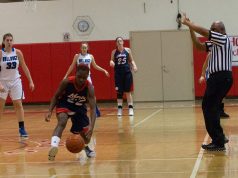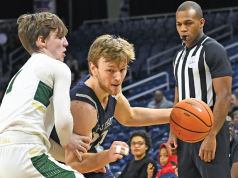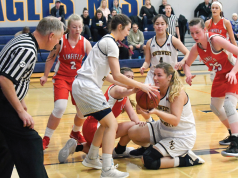Over the years, I’ve spoken to many officials approaching the end of their careers. They speak of being less keyed-up before games, grumpier during them and in considerably more pain after. These signs and others suggest to them the end is near. One of the last things to go, however, is their passion — that little furnace burning bright within that keeps us trying one more time to both contribute and enjoy the experience. Basketball officials need to commit to self-evaluation in order to make sure there’s more than just passion left in the tank.
Passion’s a fickle thing, however. For some, it’s all they need to rise to the occasion of another season or another assignment to that marquee game everyone covets. Regardless of the outcome, their positive, sunny optimism carries the day. For others, passion makes them their own worst second-guesser; they’re never good enough for themselves and can never savor the trophy fish they caught because they rue the one that got away. The rest of us are somewhere in the middle; refereeing is a spiral staircase of involvement and commitment, and the offseason comes just soon enough to rekindle the fire. The downtime is long enough to pause on the landing and contemplate what it will take to reach the next level, as the flights grow steeper. Take advantage of it.
How can you make the best use of your offseason? I knew a successful official in Canada who kept a notebook, documenting every game he worked. It contained basic details like who played, who he worked with, the score and some game statistics. Most importantly, he also wrote at length about any significant events in his effort to work the game; it was part of his postgame routine to capture these events while they were still fresh in his mind. In this format, the details of any individual game were little more than historical anecdotes. As a litany of the 50-odd games he worked throughout the year, they painted a portrait. He found common threads emerged as opportunities for improvement: If he read about too much dissent, he reconsidered his game management approach. If he made a controversial call and caused a riot, he thought about his process for recognizing certain keys in deciding a foul.
There were three important tenets at work here that you can apply to your basketball career: First, he gave himself some time after the season ended to start missing the sport; we’re often more open-minded once the battle fatigue wears off. Second, he captured his work in terms of cause-and-effect — how the participants responded to him; it didn’t matter how good he thought he was, it was the pattern of results that did … that’s hard for some of us to accept. Finally, he gave himself enough time to do something about anything he discovered. That can be important, for example, if even vertical stripes make you look fat and a weight-loss program is in order. He took his lessons and set about making the following season better; most of the time, it was.
My friend worked in a time when a cell phone hung on the jailhouse wall and a PC was the guy who sent you there. Today, we have many more efficient ways than pen and paper of documenting our roundball progress, and successful officials tend to make the most of them. Certainly, there are plenty of platforms out there like Zooom and Hudl that make it simple enough to get our hands on video of our work; raw footage always tells the truth. We’re likely to see some things about ourselves that we might not have wanted to see — or couldn’t see — during the season.
In my own experience, after a game, I tend to focus on validating that blarge in the fourth quarter that people were chirping about. In the offseason I look at 50 other calls I made like that one and ask myself if I’m closing down properly on the lane and focusing on the defender. If you try it, you might find you nailed the tough one plus the other nine you checked, but then notice something else worth pursuing. Maybe your signals get softer as your arms get heavier or you tend to rush the ball back into the play faster as the game progresses. That’s all good stuff to find out, reflect upon and fix, but you’ll only be able to if you have a process for self-evaluation that is devoid of narcissism.
Be honest to achieve sustainable personal growth
In my real job, I tell people not to settle for the easy answer when solving a problem, to keep digging until all the dots connect. If you just see what you want to see, you won’t improve very much. In officiating you must be prepared to be honest with yourself to expect any sustainable growth.
Of course, there’s another kind of honesty, too: with your partners. Chances are you have some comfort around these people. That makes the offseason a good time to get together with them and go through the review process as a group. If you’ve chosen your crewmates wisely, then you can be frank and vulnerable with one another and start solving group and individual issues successfully.
At the group level, unless the crew meets a lot during the season, bad habits, hybrid mechanics and worse can develop; it then takes a back-to-basics review during the summer to make corrections. On an individual basis, some eye-to-eye sharing — perhaps over a glass or two of truth serum — can resolve issues that have been brewing and affect crew chemistry. Hey, sometimes you might even conclude that the fit just isn’t right for one of you and decide to make a personnel change while there’s still time to find an able replacement.
Basically, the offseason is the time of year to do the right thing in just about any context. It’s the time of year when you’re engaged but not encircled, able to scrutinize while not being scrutinized. It’s a healthy time to make yourself better without it taking up so much time that it becomes the main idea of How I Spent My Summer Vacation. I realize there are many officials who see the time spent refereeing as an avocation which doesn’t/won’t/can’t work outside the dates on the league schedule. That being said, I think Referee consistently conveys this message: Leaving the job at the locker-room door is no longer satisfactory if you plan on moving up, or even if you just want to stay welcome and relevant at your current level. People expect more from us.
It takes sweat equity to succeed. Reserve some of your passion for your downtime and invest in self-improvement. It pays off.
What's Your Call? Leave a Comment:
Note: This article is archival in nature. Rules, interpretations, mechanics, philosophies and other information may or may not be correct for the current year.
This article is the copyright of ©Referee Enterprises, Inc., and may not be republished in whole or in part online, in print or in any capacity without expressed written permission from Referee. The article is made available for educational use by individuals.


















